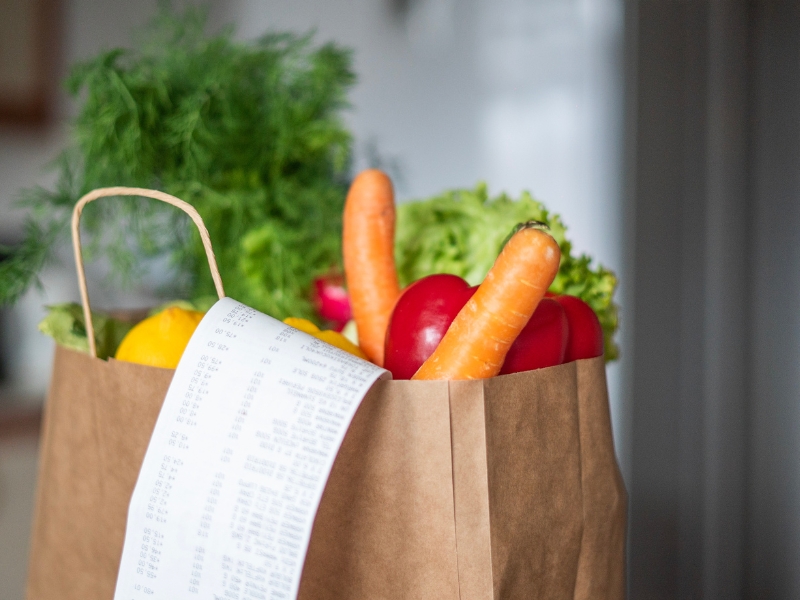Cut Costs Now: 9 Ways to Slash Your Weekly Food Bill

This post may contain affiliate links. At no cost to you, we earn a commission from qualifying purchases.
We’ve all got to eat, but you and your family can do that well without spending a small fortune on food every week. In this article, I’ll be talking about some of the things we’ve done as a family, and still do, to cut our weekly food bill and spend less on groceries without sacrificing the quality of our meals.
Before starting, let me whet your appetite for cutting your food bill (and perhaps using those savings to build an emergency fund) by highlighting a couple of interesting details.
Say you normally spend around £90 a week on food. If you can cut that by a tenner, over a year, you would save yourself a whopping £520 – enough for a lovely family weekend away or a blow-out at Christmas. Even reducing it by a fiver a week adds up to £260 a year, enough to buy a big present for your kid at Christmas.
- If you spend £120 a week and reduce that by £20, you will save £1040 a year!
- If you spend £240 a week and reduce that by £40, you will save £2080 a year!
Reducing your spending on the weekly shop by these amounts is doable. You just have to think about your spending habits and look closely at where you are spending and how you can save money.
1) Plan your meals for the week ahead
The first thing you want to do is plan your meals for the week ahead. There are several ways to do this. I prefer the old-fashioned way – pen and paper, but you might prefer using your phone or even a spreadsheet. If you prefer something a bit more fancy, try googling “printable weekly meal planners”.
When you plan your meals, don’t feel as though you have to stick to having tuna pasta bake on Wednesday just because it’s on your planner. You could have it on Tuesday or Thursday if you like.
The point of planning your meals for the week ahead is to buy the ingredients and groceries you need to make the meals you’ve planned.
Think about what you can buy that can be made into a few meals. For example, if you are cooking for 3 people and you buy a medium-sized chicken you could, in theory, make 6 meals out of it. You could make a chicken curry one day and chicken stir-fry another day. Thinking about ways you can stretch meals out is a great thing to do in advance.
Try to avoid putting ready meals on your list. You can end up paying a fortune for these, and you will be able to make them much cheaper and healthier yourself at home.
2) Create a shopping list each week and stick to it
The one thing I always do before I go grocery shopping is make a list of the food we need for the following week. Then, when I venture into Lidl, Aldi, Tesco or wherever, I rigidly stick to the list and only buy what’s on it. Okay, I might sometimes buy an unmissable special offer, but that’s only on the odd occasion. For the most part, I stick to the shopping list.
A shopping list helps me budget for the week. I know how much money I have to spend, and writing a list helps me calculate the bill so I don’t go over. The aim of my shopping list is to keep me within budget and not overspend.
3) Always check your cupboards before you shop
Have you got any idea how many people toddle off to the supermarket without looking in their cupboards to check what they need? I haven’t either but I imagine it’s quite a few!
I’ve done it myself. I’m standing there in Asda staring at the shelves trying to think if I’ve got any vegetable stock cubes or soy sauce and I end up buying them just in case, only to find out when I get home that I already have vegetable stock cubes and soy sauce!
So, checking your cupboards when making a shopping list will help you buy what you need instead of what you think you need.
4) Start cooking one-pot meals
Cooking one-pot meals can save on food ingredients and also electricity. Recently slow cookers have made a huge comeback and they are a godsend for families they really are. Have a look at this list of popular slow cookers for sale on Amazon.
You can pop say a packet of sausages in, a chopped onion, few chopped carrots and any other veg you fancy in, then get a dried packet of sausage casserole mix add the water it requires, pop the lid on and cook! That’s it, a cheap meal which uses hardly any electric at all to cook.
Other ideals are cooking a huge pan of chilli, this will always go down well, whether it’s meat based or vegetarian, you will definitely get at least 2 days worth of food from it. You can even freeze any leftovers and use them another day of your choice.
5) Buy loose vegetables (avoid the more expensive pre-packed options)
Look closely at the price per kilogram of loose vegetables as you will more often than not find it’s much cheaper to buy loose vegetables rather than the pre-packed ones (after all, someone’s got to pay for the packing process!).
In most cases, buying in bulk will translate into a reduction too.
An added bonus to buying loose veggies is you’re helping the environment by reducing the amount of plastic in circulation.
Never buy pre-packed chopped-up vegetables (unless they have a yellow reduced sticker). You’re paying through the nose for the convenience of them being chopped up. Don’t be lazy, get your loose carrots and chop them up at home (we don’t even peel ours, just wash them), they take literally minutes to do, so why pay someone else to do it for you?
6) Freeze ageing veggies before they go to waste
If you notice any of your veggies going on the turn and you don’t think you’ll use them before they go bad, chop them up, put them in a freezer bag or small container and pop them into the freezer until you need them.
Don’t let veggies go off in the fridge then chuck them away. Freeze them. Otherwise, you’re just throwing money in the bin.
7) Use vouchers and money-off coupons (don’t be embarrassed)
If you have access to the internet (most people do), start registering for supermarket newsletters, offers and deals. Remember, you don’t have to stick religiously to the same supermarket each week, go with the one that can offer you the best deals.
Look in local newspapers and magazines for money off coupons. You will be surprised at how many you can actually find.
Register online with companies such as Ashleigh Money Saver, you will find loads of money off coupons/shopping deals here.
There is no shame in taking coupons or vouchers to a supermarket. Companies wouldn’t make them if they didn’t want you to use them, and at the end of the day, you are looking to save money!
8) Take your own bags
It may seem pretty obvious, but ALWAYS take your own bags to the shops with you. We’ve recently noticed the price difference in plastic bags at supermarkets varies quite considerably from 15p – 30p.
Example: if you are spending 30p on 4 bags each week that amounts to:
30p x 4 x 52 = £62.40 per year
£62.40 per year! Just think what you could do with that money instead of buying all those bags each week!
Recycle, recycle, recycle them.
You will notice that most supermarkets will actually give you a new plastic bag free of charge if your current one (from their brand) tears or is faulty. Just ask them. Don’t be shy.
9) Try brands you don’t recognise and avoid the popular ones
Have you ever heard about brand snobbery?
Some people won’t even consider certain brands as they are viewed as inferior. Yes, we might have that preferred choice of our favourite coffee brand for example, but if we are trying to save money, we need to change the way we think about other brands. We are not saying don’t treat yourself, we are just saying try other brands, you may actually prefer them.
Supermarkets have many brands to choose from, sometimes it can be overwhelming because there is so much choice. But you must ask yourself, will the item be any less inferior because it’s not a well known brand?
Will it taste awful because it’s cheaper? Probably not.
We can’t guarantee every cheaper brand will taste better than the leading names, but it’s definitely worth experimenting.
Choose a supermarket’s own branded food and you will notice a price difference straight away. If you can save 25p on a tin of supermarket-branded baked beans, by the time you’ve completed your shop and bought their brand more often, you will definitely save yourself a few pounds.
10) Use discount supermarkets whenever you can
Similar to the previous suggestion – avoid the large supermarkets to save yourself pounds on your shopping every week. If you haven’t tried the cheaper alternatives like Lidl and Aldi, why not? Some of the products they sell are as good as Tesco or Asda and they’re cheaper. You’ll notice a big difference in the amount you spend on shopping each week.
What now?
Now you’ve got a few ideas on how to reduce your weekly food bill, start immediately, register for those supermarket newsletters, vouchers sites and get prepared for that weekly shop.
Go armed with your shopping list, money off vouchers, plastic bags and think about how much you will be saving for just pre-planning ahead.
Featured image by Abdullah Durmaz via Canva.com





